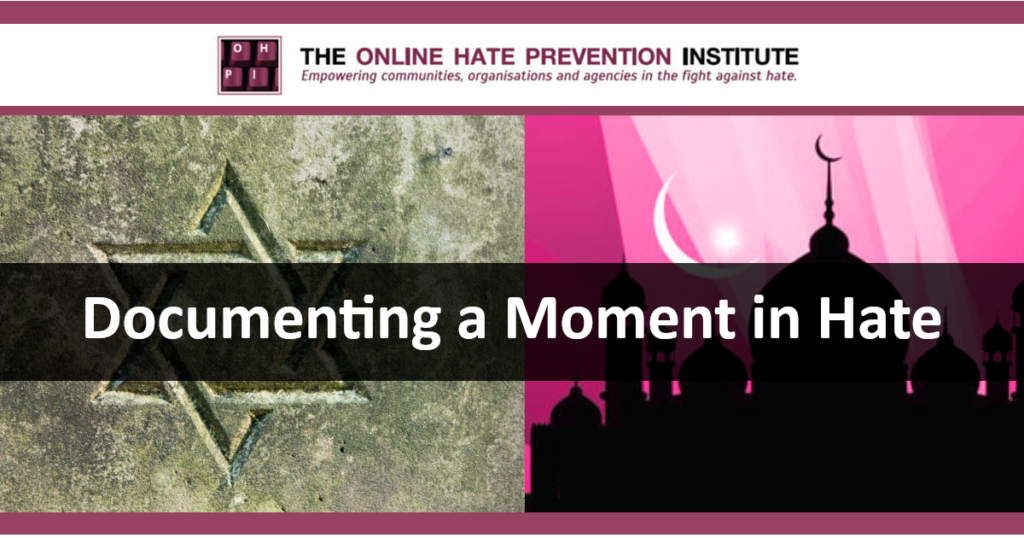
The Hamas terrorist attack on Israel and the resulting war have led to an unprecedented rise in online hate. Antisemitism and Islamophobia have both run rampant on social media. It’s created a new reality for those working to tackle internet hate to create a safer online world.
The Online Hate Prevention Institute (Australia) and Online Hate Task Force (Belgium) are civil society organisations dedicated to tackling online hate. The project “documenting a moment of hate” brings these organisations together to systematically document both antisemitism and Islamophobia as seen from both Europe and Israel, in the midst of the war, and from the other side of the world in Australia.
Project Methodology
The project uses experts from both organisations to monitor nine online platforms: Twitter, Facebook, Telegram, TikTok, Gab, YouTube, Bitchute, Instagram, and Reddit. Only English language content is being monitored. The monitoring methodology is adapted from the Online Hate Prevention Institute’s latest antisemitism monitoring, and draws on categories of antisemitism from that work, and categories of Islamophobia used by OHPI in past reports and published in the book Islamophobia in Cyberspace. The methodology has been adapted to account for the current intensity of online hate and the rapidly changing environment.
Project Outcomes
The project will allow the nature and volume of both antisemitism and Islamophobia to be compared across the platforms, and across what is seen in Europe compared to what is seen in Australia. It will also assess the response of social media platforms to removing content during the current crisis. This hard data will increase understanding of both the nature and magnitude of the problem during this moment of crisis. It will inform the responses of the technology platforms, government officials, and political leaders we work with.
Funding the Project
The project has been initiated without a financial backer. We can’t afford to wait for a grant, a fundraiser, or meetings with donors. This crisis needs a response now. Any help to cover its costs would be very welcome and donations can be made at: https://ohpi.org.au/donate/
Update on the work so far
In less than three weeks we have documented 794 items of hate on social media. The hate was most prolific on X/Twitter but Facebook, Gab, and Telegram are not far behind.
For most of the content it is no immediately obvious where the poster in based. Of those cases where a location can be quickly identified, North America is the most common location, followed by Australia at about half that level, followed by Europe at half again. This highlighted the permissiveness given to online hate in Australia, largely due to a lack of government engagement (eSafety for example has no remit to address hate directed against entire communities) or support for civil society, like OHPI, working in this space.
The nature of the online hate has changed with content being far more blatant and direct.
The most prominent form of Islamophobia right now is demonisation, closely followed by claims that all Muslims are violent/terrorist, then the claim that Muslims don’t belong and are a threat to “our culture”. These are old far-right claims recycled. The signal a return to the height of anti-Muslim sentiment around 2015. Content glorifying the October 7 terrorist attack, or seeking to excuse or justify it, creates fertile ground for this content to spread in response.
The most prominent form of antisemitism is traditional antisemitism, specifically the spread of Jewish conspiracy theories (whether about control of governments or the media), followed by dehumanisation of Jews, and content echoing cklassic antisemitic tropes such as blaming Jews for killing Jesus, or blood libels. A significant amount of the content relates to incitement to violence and involves calling for, justifying, or glorifying in the killing of Jews. This is last is a significant shift from the norm where such content is rare.
The growth of antisemitism is higher than the growth of Islamophobia, but both are at significantly elevated levels and need attention. Despite difference over Middle East policy, Jewish and Muslim communities need maintain a dialogue and work together to defray tensions and to cooperate in tackling online hate impacting both communities.
